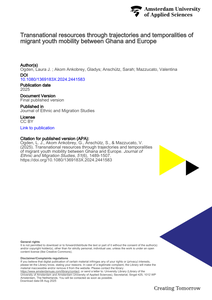In this article we look at the various paths taken by transnational and domestic entrepreneurs based on their education and work experience. These act as catalysts for skills that allow migrant entrepreneurs to better position themselves in different markets. Differences in migrant entrepreneurs allow us to better understand the strategies employed and the consequences for society and the economy at both domestic and transnational levels. Earlier research has extensively analysed individual characteristics of migrant entrepreneurs and, to a much lesser extent, the geographical nature of their business activities.This article addresses this gap by looking at the geographical orientation of migrant entrepreneurs’ businesses. The research question is as follows: In what ways are transnational or domestic activities of Moroccan migrant entrepreneurs in the Netherlands and Italy influenced by skills acquired in earlier experiences? We provide empirical evidence on the different paths leading to domestic and transnational activities using a micro-level perspective of the experiences collected in the narratives of first-generation Moroccan migrant entrepreneurs who have migrated to Milan or Amsterdam (N=70).Four different paths combining these two life experiences emerged from the interviews: #1 Job-based, #2 Education-driven, #3 Job-education merger, and #4 By chance (neither education nor work experience). The most relevant paths for migrant entrepreneurs seem to be the first (#1) and third (#3) paths. Furthermore, our findings show that transnationally oriented entrepreneurs have an extended business-oriented education and rely on skills learned, in contrast to domestically oriented entrepreneurs who become entrepreneurs ‘by chance’.
DOCUMENT

Research on migrant youth makes two longstanding assumptions: that they are immobile following their own or their parents’ migration and that their resource environments are confined to their country of residence. Recent investigations of transnational youth mobility question both assumptions, showing that migrant youth – including the first and second generations – are highly mobile, and that their mobility has multiple impacts on their lives. This paper seeks to add to this growing literature by conceptualising as ‘transnational resources’ the perspectives, values, knowledge, and skills that migrant youth gain from their mobility between their countries of origin and residence and which become meaningful in various aspects of their multi-local (or what we call transnational) lives. Drawing on ethnographic data with 81 young people who are mobile between Ghana and three European countries (Belgium, Germany, and the Netherlands), we analyse the three main transnational resources we identified – enhanced sense of self, adaptability, and future outlook. Engaging the dual analytical lenses of temporalities and trajectories, we show both how transnational resources are gained through embodied mobility experiences and how they become meaningful in migrant youth’s lives across time and space.
DOCUMENT

Reading a novel about a dying person and the people attending the dying, one can not only reflect upon the moral involvement between the literary characters depicted, but also upon the way in which the reader takes the position of a “bystander” in this scene. In two novels, The Death of Ivan Ilyich by Tolstoy and The Big Ward by the Dutch author Jacoba van Velde, this moral involvement can be interpreted as a form of “compassion”. Martha Nussbaum’s concept of “compassionate imagination” offers a perspective on the way in which the reader can be involved in this literary depiction of the dying. However, the Aristotelian criteria that Nussbaum proposes for the rational judgement of compassion and her ambitions that literature can “raise society’s floor” by developing “compassionate imagination” in readers, are difficult to apply to these specific cases. In comparing both novels, it is exactly the differences between them – the historical context and social classes depicted - that bring to light a problematic presupposition in Nussbaum, namely the a-historical universality in the compassionate involvement. A re-interpretation of one of the Aristotelian criteria for compassion leaves room for a “compassionate imagination” not based on a rational judgement but on a sense of shared vulnerability that is precisely evoked by the literary depiction of the dying.
LINK